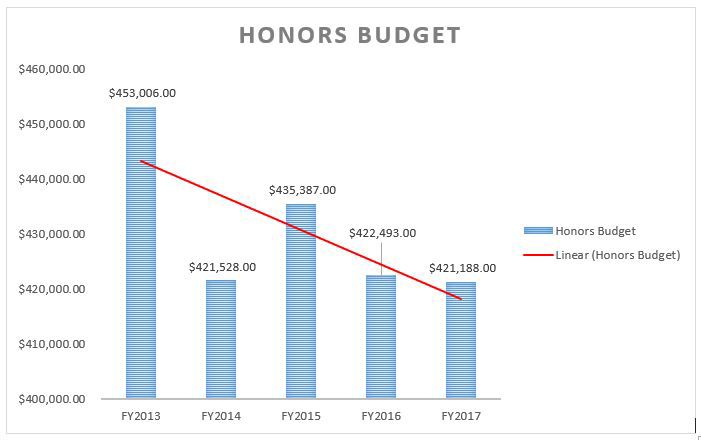Honors Program lacks resources
November 28, 2016
DeKALB | Over the past five years, the University Honors Program has seen the faces of four different directors, causing instability for students and the program.
This year, Todd Gilson was named the program’s director. Anne Birberick, vice provost of the Office of the Executive Vice President and Provost, said she thinks he will bring stability to the program as it moves forward. Birberick works closely with Gilson, along with the directors of 16 other departments.
Turnover
Staffing for the Honors Program has been inconsistent, as only about two members of staff have worked with the past four directors. Jason Goode, assistant to the associate vice provost in the University Honors Program, is one of the two staff members.
“I think maybe the different directors may have a different outlook on things and may have different priorities, so you may see a shift,” Goode said. “The job for me remains the same despite who the directors are, so I don’t think working with a new director has made the job more difficult; I think it’s just a chance to get a new perspective.”
Lexie Williams, senior public health administration major, has worked closely with the previous three directors and said having such a high turnover rate has been a challenge.
“There have been challenges in terms of knowledge [and] having to retrain a director obviously is difficult,” Williams said. “Obviously having to share your knowledge on everything and the current processes and programs takes more time than it would if we could just continue forward with the conversation.”
The inconsistency in leadership for the program has many factors, but according to past directors who did not wish to disclose their identities, structure may be one of the program’s biggest flaws.
Structure
As vice provost, it is Birberick’s job to meet with the 17 departmental directors, including Gilson, to determine which of their concerns should be brought to Provost Lisa Freeman.
It is Freeman’s job to supervise curricular, instructional and research affairs concerning NIU. As provost, Freeman also serves as chief academic officer and leads the Division of Academic Affairs serving as NIU’s second highest official.
“So I think there are 16 or 17 units [that report to me],” Birberick said. “I’m sorry I’m vague. I work with all of them and how much contact I have with them fluctuates.”
If Gilson has a concern about the Honors Program, he is unable to bring it directly to decision makers such as Freeman and deans of other colleges on campus. Instead, Gilson must schedule a meeting with Birberick, who then becomes responsible for determining the relevance of the concern and whether it should reach the ears of deans.
Other institutions, such as Eastern Illinois University, have structured their programs differently by replacing the honors director with an honors dean, who reports directly to the school’s provost. Richard England, honors dean at Eastern Illinois University, has held the position for four years where this structure is followed.
“In practice, I think an advantage to [Eastern’s] system is that when there are changes in policy or when there are concerns about different university functions, the honors college, and therefore honors students, are represented,” England said.
Before working as Eastern’s honors dean, England worked as an honors director at Salisbury University in Maryland and said he can see the costs and benefits of both structures. He said having the administrative title “dean” indicates respect and commitment from the university to the program and the students enrolled.
A reform of the structure is not being talked about, but previous directors said it should be because the position deserves more respect, Birberick said.
Resources
NIU has been cutting the budget of the Honors Program with the exception of Fiscal Year 2015. This fiscal year, the program will receive the least amount of funding in five years.
The Program Prioritization Administrative Task Force placed the program in the enhanced resources category, suggesting the program “has the potential to increase enrollment as well as improve the academic profile of the institution,” according to the task force report. The task force also acknowledged the inadequate funding allotted for the program.
Daniel Kempton, who works as the vice president for Academic Affairs at Franciscan University of Steubenville, served as NIU’s honors director from 2009 to 2011 and said he felt he did not receive the resources he needed.
During Kempton’s time at NIU as honors director, he established new programs and administration saw a rise in the number of students participating in the program. Kempton said despite achieving this, he still felt it was a challenge being heard.
“I think [NIU] was in a period already at that time where the competition for resources was very intense, and I valued the honors program [so much] that I thought that it would receive resources more readily than it did,” Kempton said. “I did think we had a supportive administration at the time, [but] it was challenging.”







